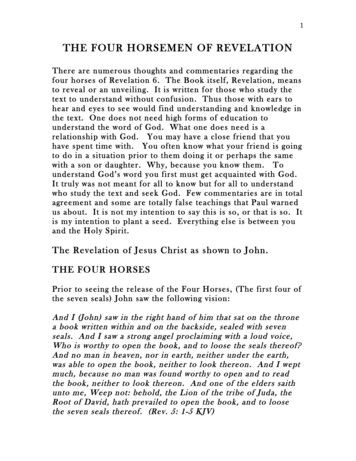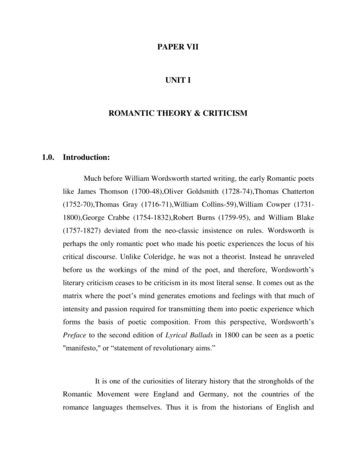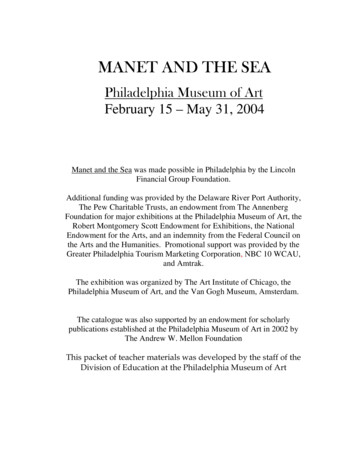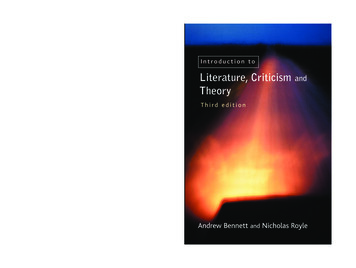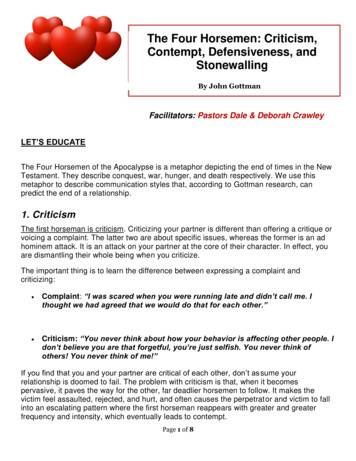
Transcription
The Four Horsemen: Criticism,Contempt, Defensiveness, andStonewallingBy John GottmanFacilitators: Pastors Dale & Deborah CrawleyLET’S EDUCATEThe Four Horsemen of the Apocalypse is a metaphor depicting the end of times in the NewTestament. They describe conquest, war, hunger, and death respectively. We use thismetaphor to describe communication styles that, according to Gottman research, canpredict the end of a relationship.1. CriticismThe first horseman is criticism. Criticizing your partner is different than offering a critique orvoicing a complaint. The latter two are about specific issues, whereas the former is an adhominem attack. It is an attack on your partner at the core of their character. In effect, youare dismantling their whole being when you criticize.The important thing is to learn the difference between expressing a complaint andcriticizing: Complaint: “I was scared when you were running late and didn’t call me. Ithought we had agreed that we would do that for each other.” Criticism: “You never think about how your behavior is affecting other people. Idon’t believe you are that forgetful, you’re just selfish. You never think ofothers! You never think of me!”If you find that you and your partner are critical of each other, don’t as sume yourrelationship is doomed to fail. The problem with criticism is that, when it becomespervasive, it paves the way for the other, far deadlier horsemen to follow. It makes thevictim feel assaulted, rejected, and hurt, and often causes the perpetrator and victim to fallinto an escalating pattern where the first horseman reappears with greater and greaterfrequency and intensity, which eventually leads to contempt.Page 1 of 8
2. ContemptThe second horseman is contempt. When we communicate in this state, we are trulymean—we treat others with disrespect, mock them with sarcasm, ridicule, call them names,and mimic or use body language such as eye-rolling or scoffing. The target of contempt ismade to feel despised and worthless.Contempt goes far beyond criticism. While criticism attacks your partner’s character,contempt assumes a position of moral superiority over them:“You’re ‘tired?’ Cry me a river. I’ve been with the kids all day, running around likemad to keep this house going and all you do when you come home from work is flopdown on that sofa like a child and play those idiotic video games. I don’t have time todeal with another kid. Could you be any more pathetic?”Research even shows that couples that are contemptuous of each other are more likely tosuffer from infectious illness (colds, the flu, etc.) than others due to weakened immunesystems! Contempt is fueled by long-simmering negative thoughts about the partner—which come to a head when the perpetrator attacks the accused from a position of relativesuperiority.Most importantly, contempt is the single greatest predictor of divorce. It must be eliminated.3. DefensivenessThe third horseman is defensiveness, and it is typically a response to criticism. We’ve allbeen defensive, and this horseman is nearly omnipresent when relationships are on therocks. When we feel unjustly accused, we fish for excuses and play the innocent victim sothat our partner will back off.Unfortunately, this strategy is almost never successful. Our excuses just tell our partnerthat we don’t take their concerns seriously and that we won’t take responsibility for ourmistakes: Question: “Did you call Betty and Ralph to let them know that we’re not comingtonight as you promised this morning?” Defensive response: “I was just too darn busy today. As a matter of fact, youknow just how busy my schedule was. Why didn’t you just do it?”This partner not only responds defensively, but they reverse blame in an attempt to make itthe other partner’s fault. Instead, a non-defensive response can express acceptance ofresponsibility, admission of fault, and understanding of your partner’s perspective:Page 2 of 8
“Oops, I forgot. I should have asked you this morning to do it because Iknew my day would be packed. That’s my fault. Let me call them rightnow.”Although it is perfectly understandable to defend yourself if you’re stressed out and feelingattacked, this approach will not have the desired effect. Defensiveness will only escalatethe conflict if the critical spouse does not back down or apologize. This is becausedefensiveness is really a way of blaming your partner, and it won’t allow for healthy conflictmanagement.4. StonewallingThe fourth horseman is stonewalling, which is usually a response to contempt.Stonewalling occurs when the listener withdraws from the interaction, shuts down, andsimply stops responding to their partner. Rather than confronting the issues with theirpartner, people who stonewall can make evasive maneuvers such as tuning out, turningaway, acting busy, or engaging in obsessive or distracting behaviors.It takes time for the negativity created by the first three horsemen to become overwhelmingenough that stonewalling becomes an understandable “out,” but when it does, it frequentlybecomes a bad habit. And unfortunately, stonewalling isn’t easy to stop. It is a result offeeling physiologically flooded, and when we stonewall, we may not even be in aphysiological state where we can discuss things rationally.If you feel like you’re stonewalling during a conflict, stop the discussion and ask yourpartner to take a break:“Alright, I’m feeling too angry to keep talking about this. Can we pleasetake a break and come back to it in a bit? It’ll be easier to work throughthis after I’ve calmed down.”Then take 20 minutes to do something alone that soothes you—read a book or magazine,take a walk, go for a run, really, just do anything that helps to stop feeling flooded —andthen return to the conversation once you feel ready.The Antidotes to the Four HorsemenBeing able to identify the Four Horsemen in your conflict discussions is a necessary firststep to eliminating them, but this knowledge is not enough. To drive away destructivecommunication and conflict patterns, you must replace them with healthy, productive ones.Page 3 of 8
The Antidote to Criticism: Gentle Start-UpA complaint focuses on a specific behavior, but criticism attacks a person’s verycharacter. The antidote for criticism is to complain without blame by using a soft or gentlestart-up. Avoid saying “you,” which can indicate blame, and instead talk about your feelingsusing “I” statements and express what you need in a positive way.To put it simply, think of these two things to formulate your soft start-up: What do I feel?What do I need?Criticism: “You always talk about yourself. Why are you always so selfish?”Antidote: “I’m feeling left out of our talk tonight and I need to vent. Can we pleasetalk about my day?”Notice that the antidote starts with “I feel,” leads into “I need,” and then respectfully asks tofulfill that need. There’s no blame or criticism, which prevents the discussion fromescalating into an argument.The Antidote to Contempt: Build a Culture of Appreciation andRespectContempt shows up in statements that come from a position of moral superiority. Someexamples of contempt include sarcasm, cynicism, name-calling, eye-rolling, sneering,mockery, and hostile humor. Contempt is destructive and defeating. It is the greatestpredictor of divorce, and it must be avoided at all costs.The antidote to contempt is to build a culture of appreciation and respect in yourrelationship, and there are a few ways to do that. One of our mottos is Small Things Often:if you regularly express appreciation, gratitude, affection, and respect for your partner,you’ll create a positive perspective in your relationship that acts as a buffer for negativefeelings. The more positive you feel, the less likely that you’ll feel or express contempt!Another way that we explain this is our discovery of the 5:1 “magic ratio” of positive tonegative interactions that a relationship must have to succeed. If you have five or morepositive interactions for every one negative interaction, then you’re making regular depositsinto your emotional bank account, which keeps your relationship in the green.Contempt: “You forgot to load the dishwasher again? Ugh. You are so incrediblylazy.” (Rolls eyes.)Page 4 of 8
Antidote: “I understand that you’ve been busy lately, but could you please rememberto load the dishwasher when I work late? I’d appreciate it.”The antidote here works so well because it expresses understanding right off the bat. Thispartner shows how they know that the lack of cleanliness isn’t out of laziness or malice, andso they do not make a contemptuous statement about their partner or take any position ofmoral superiority.Instead, this antidote is a respectful request, and it ends with a statement of appreciation.The Antidote to Defensiveness: Take ResponsibilityDefensiveness is defined as self-protection in the form of righteous indignation or innocentvictimhood in attempt to ward off a perceived attack. Many people become defensive whenthey are being criticized, but the problem is that being defensive never helps to solve theproblem at hand.Defensiveness is really a way of blaming your partner. You’re saying that the problem isn’tme, it’s you. As a result, the problem is not resolved and the conflict escalates further. Theantidote is to accept responsibility, even if only for part of the conflict.Defensiveness: “It’s not my fault that we’re going to be late. It’s your fault since youalways get dressed at the last second.”Antidote: “I don’t like being late, but you’re right. We don’t always have to leave soearly. I can be a little more flexible.”By taking responsibility for part of the conflict (trying to leave too early), even whileasserting that they don’t like to be late, this partner prevents the conflict from escalating byadmitting their role in the conflict. From here, this couple can work towards a compromise.The Antidote to Stonewalling: Physiological Self-SoothingStonewalling is when someone completely withdraws from a conflict discussion and nolonger responds to their partner. It usually happens when you’re feeling flooded oremotionally overwhelmed, so your reaction is to shut down, stop talking, and disengage.And when couples stonewall, they’re under a lot of emotional pressure, which increasesheart rates, releases stress hormones into the bloodstream, and can even trigg er a fight-orflight response.Page 5 of 8
In one of our longitudinal research studies, we interrupted couples after fifteen minutes ofan argument and told them we needed to adjust the equipment. We asked them not to talkabout their issue, but just to read magazines for half an hour. When they started talkingagain, their heart rates were significantly lower and their interaction was more positive andproductive.What happened during that half hour? Each partner, without even knowing it,physiologically soothed themselves by reading and avoiding discussion. They calmeddown, and once they felt calm, they were able to return to the discussion in a respectfuland rational way.Therefore, the antidote to stonewalling is to practice physiological self-soothing, and thefirst step of self-soothing is to stop the conflict discussion and call a timeout:“Look, we’ve been through this over and over again. I’m tired of reminding you—”“Honey, I’m sorry to interrupt you, but I’m feeling overwhelmed and I need to take abreak. Can you give me twenty minutes and then we can talk?”If you don’t take a break, you’ll find yourself either stonewalling and bottling up youremotions, or you’ll end up exploding at your partner, or both, and neither will get youanywhere good.So, when you take a break, it should last at least twenty minutes because it will take thatlong before your body physiologically calms down. It’s crucial that during this time youavoid thoughts of righteous indignation (“I don’t have to take this anymore”) and innocentvictimhood (“Why is he always picking on me?”). Spend your time doing somethingsoothing and distracting, like listening to music, reading, or exercising. It doesn’t reallymatter what you do, as long as it helps you to calm down.You’ve got the skills. Use them!Now that you know what the Four Horsemen are and how to counteract them with theirproven antidotes, you’ve got the essential tools to manage conflict in a healthy way. Assoon as you see criticism or contempt galloping in, remember their antidotes. Be vigilant.The more you can keep the Four Horsemen at bay, the more likely you are to have a stableand happy relationship.Page 6 of 8
Page 7 of 8
Page 8 of 8
The Four Horsemen: Criticism, Contempt, Defensiveness, and Stonewalling By John Gottman Facilitators: Pastors Dale & Deborah Crawley LET’S EDUCATE The Four Horsemen of the Apocalypse is a metaphor depicting the end of times in the New Testament. They describe c



